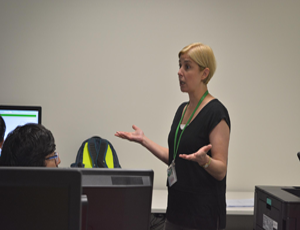 Dr. Donna Velliaris
Dr. Donna VelliarisCertification: Although the certification process can be as rigorous as that for a licensure program, ‘certification’ is distinguished from ‘licensure’ because it is generally non-governmental and voluntary. Unlike licensure, certification is not permission to act i.e., certification does not involve the regulatory power of individual states and does not grant the privilege to practice. In brief, certification attests to certain qualifications possessed by an individual.
Licensure: The most restrictive form of credentialing refers to the granting of a license by a governmental or delegated e.g., regulatory body, to practice a profession. The primary purpose of licensure is to protect the health, safety and welfare of the public by restricting practice of the profession to individuals who possess the knowledge and skills required to do so competently.
Although all US public school teachers must be licensed, there is one context in which one can teach without such a credential—private schools (also referred to as non-state or independent schools). US private schools, at home and abroad, may hire educators without an official teachers’ license, but this does not mean that they are not seeking high-quality candidates. However, while they may employ an unlicensed applicant who is exceptionally talented and can mix well with students’ parents, there appears to be an underlying assumption that a license is a mere formality as ‘other’ personal attributes outshine that authorization.
…the idea that anyone with a baccalaureate degree can do an effective job of teaching with little or no training runs counter to almost everything true about education.
—The Marquette Educator [online news], 15 May 2011
There is no such thing as a natural-born teacher and teaching is not simply a matter of possessing and disseminating subject matter knowledge to students. Without doubt, some individuals may seem ideally suited to the profession e.g., enjoying instructional talent from the outset. Generally, professional regulations address requirements in three primary areas: (1) education; (2) experience; and (3) testing. There are some professions that permit individuals to practice without a license, but they place limitations on what they may be allowed to do.
Given the importance of expertise to professions, it naturally follows that one of the most fundamental attributes of professions is specialization—professionals are not generalists, amateurs, or dilettantes, but possess expertise over a specific body of knowledge and skill.
—Ingersoll & Merrill, 2011, p. 190.
When pre-service teachers complete their qualification prior to obtaining their first full-time teaching appointment, they have usually engaged in university-level courses on pivotal matters such as behavior management and curriculum development, and spent hours in the classroom under the supervision of a seasoned mentor before attempting to independently handle today’s heterogeneous class. Pre-service practicum placements count towards the minimum number of hours set for registration as a licensed practitioner. On the other hand, it can be seen that an unlicensed teacher may be afforded autonomy in the classroom, yet never intend to make teaching their vocation.
Professions, for example, exert substantial control over the curriculum, admissions, and accreditation of professional training schools; set and enforce behavioral and ethical standards for practitioners; and exert substantial control over who their future colleagues are to be.
—Ingersoll & Merrill, 2011, p. 191.
A professional teacher preparation accrediting body requires the parallel development of: (a) teaching knowledge that is specific to the content being taught; as well as (b) pedagogical knowledge and awareness of child and adolescent development i.e., foundational insights that positively affect students’ learning. Although becoming licensed may occur in varied ways, regardless of the requirements for that region/state, criteria should be substantial as underqualified persons can impede school children by virtue of everything they fail to bring to the classroom. Thus, the traditional route to K-12 teacher licensure is ethically more responsible than hiring candidates without a license in-hand. When school administrators conflate ‘potential’ and/or ‘lived experience’ with ‘expertise’, they are jeopardizing the overall quality control system that this profession executes in contemporary society.
To sum up, it’s become a cliché for educators to wonder, if society doesn’t let amateurs practice medicine or law and most other true professions, why would we let them teach? Should they really be able to practice on school children—our world’s most precious treasures?
—The Marquette Educator [online news], 15 May 2011
No credible research reveals any advantage to students having teachers without adequate training, and comparing ‘licensed’ and ‘unlicensed’ K-12 teachers is nonsensical. Unlicensed teachers should not come into the mix—
Why are they even considered in employment applications? Indeed, the quality of different licensed teachers would make far more sense, as these persons have made teaching their vocation (at least at the time of licensure) and have passed the requirements regarded as requisite in a particular region/state within which they are/were based. Certainly, their praxis may be deemed inept after licensure, but the fact of the matter remains that they were ‘licensed’ in the first place.
QUESTION: If the best education systems in the world train their teachers rigorously and effectively, how can employing unlicensed teachers be permissible? Please share your thoughts in the Comments section below.Disclaimer: The opinions expressed in this article are the author’s own and do not reflect the views of IGI Global.
Newsroom Contact
Caroline Campbell
Promotions Assistant
ccampbell@igi-global.com
(717) 533-8845, ext. 144
www.igi-global.com/Reference:
Ingersoll, R. M. & Merrill, E. (2011). The status of teaching as a profession. In J. Ballantine & J. Spade (Eds.), Schools and society: A sociological approach to education. (pp. 185-189) 4th Ed. CA: Pine Forge Press/Sage Publications.